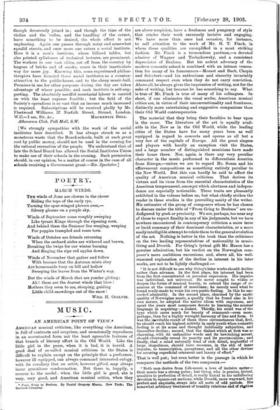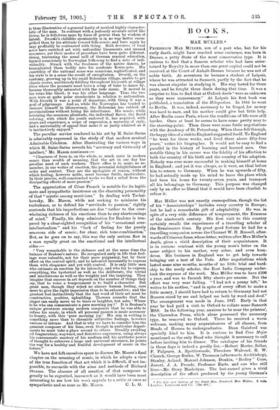MUSI C.
AN AMERICAN POINT OF VIEW.*
AMERICAN musical criticism, like everything else American, is full of contrasts and surprises, and occasionally reproduces in an accentuated form not the least agreeable features of that branch of literary effort in the ma World. Like the little girl in the poem, when it is bad, it is horrid. A good deal of so-called musical criticism in the States is difficult to explain except on the principle that a performer, however ill equipped, can always command interested eulogy, with its corollary that an artist, however gifted, may always incur gratuitous condemnation. But there is, happily, a reverse to the medal : when the little girl is good, she is very, very good, and American musical critics, when they • From Grisg to Brahma. By Daniel Gregory Mason. New York: The Outlook Company.
are above suspicion, have a freshness and pungency of style that render their work extremely incisive and engaging.
We have more than once had occasion, for instance, to call attention to the work of Mr. H. T. Finch, in whom these qualities are exemplified in a most striking fashion. Mr. Finch is a tremendous partisan,—a devoted' admirer of Wagner and Tschaikowsky, and a consistent depreciator of Brahma. But his ardent advocacy of the modern romantic school is combined with an intense venera- tion for many of its forerunners—Mozart and Bach, Chopin and Schubert—and his enthusiasm and sincerity invariably command respect even when they do not carry conviction.
Above all, he always gives the impression of writing, not for the sake of writing, but because he has something to say. What is true of Mr. Finch is true of many of his colleagues. In short, if one eliminates the venal scribe, American musical critics are, in virtue of their unconventionality and frankness, distinctly more entertaining and suggestive companions than their Old World contemporaries.
The material that they bring their faculties to bear upon is the same. The literature of the art is equally avail- able in the New as in the Old World, while the leading cities of the States have for many years been as well equipped in regard to concerts and operas as all but a very few of the capitals of Europe. All the great singers and players with hardly an exception visit the States, and a large number of distinguished musicians have made their home there. Nor, again, is there any very peculiar character in the music performed to differentiate America from Europe,—unless we are to regard Mr. Sousa and his effervescent compositions as something entirely peculiar to the New World. But this can hardly be said to affect the quality of American musical criticism. That derives its virtues and its vices from the essential characteristics of the American temperament, amongst which alertness and indepen- dence are especially noticeable. These traits are pleasantly exhibited in the volume before us; but what chiefly strikes the reader in these studies is the prevailing sanity of the writer. His estimates of the group of composers whom he has chosen to discuss under the title of "From Grieg to Brahma" are un- disfigured by gush or preciosity. We are, perhaps, too near any of these to expect finality in any of his judgments, but we have nowhere encountered in contemporary criticism a more terse or lucid summary of their dominant characteristics, or a more easily intelligible attempt to relate them to the general evolution of the art. Nothing is better in the book than the criticisms on the two leading representatives of nationality in music, Grieg and Dvorak. For Grieg's lyrical gift Mr. Mason has a genuine admiration, but his verdict on the Norwegian com- poser's more ambitious excursions, and, above all, his well- reasoned explanation of the decline in interest in his later works, are not to be lightly challenged :—
" It is not difficult to see why Grieg,'s later works should decline rather than advance. In the first place, his interest had been from the first concentrated on personal expression. His impulse was individual, not universal. He never sought to widen or deepen the forms of musical beauty, to extend the range of re- sources at the command of musicians ; he merely used what he found ready-made to voice his own poetic feeling. In this he suc- ceeded admirably. In the second place, charmed by the exotic quality of Norwegian music, a quality that he found also in his own nature, he adopted the native idiom with eagerness, and spent the years most composers devote to learning the musical language in acquiring—a dialect. Thirdly, his mind was of the type which cares much for beauty of ornament—even more, perhaps, than for a highly wrought harmony of line and form. It was the inevitable result of these three circumstances that, first, he should reach his highest activity in early youth when romantic feeling is at its acme and thought habitually subjective, and thereafter decline; second, that the dialect which at first was so charming, with its unfamiliar words and its bewitching accent, should eventually reveal its paucity and its provincialism ; and finally, that a mind naturally fond of rich detail, neglectful of large shapeliness, should have recourse, in the ebb of inner impulse, to transcription, paraphrase, and all the other devices for securing superficial ornament and luxury of effect."
That is well put; but even better is the passage in which he compares the methods of the two composers :— " Both men derive from folk-music a love of incisive meter— their music has a strong pulse; but Grieg, who is precise, lyrical, sensitive to perfection of detail, is really finical in his unfaltering devotion to square-cat sections, while Dvori.k, more wayward, less perfect and exquisite, strays into all sorts of odd periods. His somewhat arbitrary treatment of tonality relations and of rhythm
is thus illustrative of a general laxity of method highly character- istic of the man. In contrast with a jealously accurate artist like Grieg, he is felicitous more by force of genius than by wisdom of intent. Dvorak's childlike spontaneity is in no way better exem- plified than by his attitude toward folk-music, and here again he
may profitably be contrasted with Grieg. Both devotees of local color have enriched art with unfamiliar lineaments and unused resources, yet their modes of procedure have been quite different. Grieg, traversing the usual mill of German musical education, turned consciously to Norwegian folk-song to find a note of indi- viduality. Struck with the freshness of the native dances, he transplanted them bodily into his academic flower-pots. His courtship of the national muse was conscious, sophisticated, and his style is in a sense the result of exoogitation. Dvorak, on the contrary, growing up in his small Bohemian village, unable to get classic scores, assiduously fiddling throughout his youth at village fetes where the peasants must have a scrap of tune to dance by, became thoroughly saturated with the rude music. It moved in his veins like blood; it was his other language. Thus the two men were at quite polar standpoints in relation to nationalism. With Dvorak it was a point of departure, with Grieg it was a goal of pilgrimage. And so, while the Norwegian has tended to immure himself in idiosyncrasy, the Bohemian has rubbed off provincialisms without losing his inheritance. His music, while retaining the sensuous plenitude, the individual flavor, the florid coloring, with which his youth endowed it, has acquired, with years and experience, a scope of expression, a maturity of style, and a universality of appeal that make it as justly admired as it is instinctively enjoyed."
The peculiar service rendered to his art by M. Saint-Satins is admirably expressed in the study of that modern musical Admirable Crichton. After illustrating the various ways in which M. Saint-Sans reveals his " accuracy and virtuosity of intellect," Mr. Mason continues :- " Clearness of form is, on the whole, so much rarer in modern music than wealth of meaning, that the art in our day has -peculiar need of such workers. Their office is to make us re- member, in our welter of emotion, the perennial delightfulness of order and control. They are the apologists of reason, without which feeling, however noble, must become futile, inarticulate. In their precise, well-constructed works we find a relief from the dissipating effects of mere passion."
The appreciation of Cesar Franck is notable for its legiti- mate and sympathetic insistence on the charming personality of that " mystic among musicians." In dealing with Tschai- kowsky, Mr. Mason, while not seeking to minimise his turbulence, or to defend his " servitude to passion," rightly ,contends that his imperfections are due " rather to the over- whelming richness of his emotions than to any shortcomings .of mind." Finally, his deep admiration for Brahms is tem- pered by a clear-sighted recognition of his " occasional over- intellectualism" and his "lack of feeling for the purely sensuous side of music ; for clear, rich tone-combination." But, as he goes on to say, this was the only serious flaw in a man equally great on the emotional and the intellectual sides :- "Very remarkable is the richness and at the same time the balance of Brahms's nature. He recognised early in life that feel- ings were valuable, not for their mere poignancy, but by their effect on the central spirit; and he laboured. incessantly to express them with eloquence and yet with control. It is only little men who estimate an emotion by its intensity, and who try to express everything, the hysterical as well as the deliberate, the trivial and mischievous as well as the weighty and the inspiring. They imagine that success in art depends on the number of things they say, that to voice a temperament is to build a character. But great men, though they reject no sincere human feeling, care more to give the right impression than to be exhaustive ; and the greatest feel instinctively that the last word of their art must be constructive, positive, upbuilding. Thoreau remarks that the singer can easily move us to tears or laughter, but asks, ' Where is he who can communicate a pure morning joy P' It is Brahms's unique greatness among modern composers that he was able to infuse his music, in which all personal passion is made accessory to beauty, with this `pure morning joy.' His aim in writing is something more than to chronicle subjective feelings, however various or intense. And that is why we have to consider him the greatest composer of his time, even though in particular depart- ments he must take a place second to others. Steadily avoiding all fragmentary, wayward, and distortive expression, using always his consummate mastery of his medium and his synthetic power of thought to subserve a large and universal utterance, he points the way for a healthy and fruitful development of music in the future."
We have not left ourselves space to discuss Mr. Mason's final chapter on the meaning of music, in which he adopts a view of the true function of that art which it is difficult, if not im- possible, to reconcile with the aims and methods of Richard Strauss. The absence of all mention of that composer is greatly to be regretted, inasmuch as it would have been most interesting to see how his work appeals to a critic at once so
sympathetic and so sane as Mr. Mason. C. L. G.











































 Previous page
Previous page